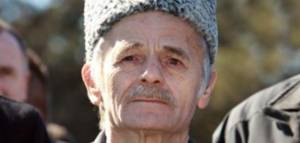Soviet tactics in ongoing attacks on Mustafa Dzhemilev

There is no let-up in the aggressive attack by Russia and its occupation regime in the Crimea on the veteran Crimean Tatar leader, Mustafa Dzhemiliev. Having banned the 71-year-old former political prisoner and Ukrainian MP from the Crimea, they are now using dirty methods to exert influence on members of his family still in the Crimea.
As reported, a search was carried out on May 15 of the family home Over 10 busloads of armed OMON riot police cordoned off the entire block before undertaking the search. Dzhemiliev’s wife was taken ill as a consequence and needed to be hospitalized. The excuse then that the new regime did not trust the investigation carried out against Dzhemiliev’s son Khaiser on manslaughter or murder charges convinced nobody. The search coincided with searches of the homes of member of the Mejlis of the Crimean Tatar People, Ali Khamzin and many other Crimean Tatars. In the latter cases the pretext seems to have been suspected ‘terrorism’.
Media sources have unfortunately circulated the assertion made by a certain Yury Fetiev on Facebook that Khaiser has taken on Russian citizenship. Fetiev claimed his information was from ‘concerned officials’ from the Russian migration service and attached a photo supposedly of the relevant document in Khaiser Dzhemiliev’s name. He then refers to equally anonymous personnel of the SIZO [remand unit] who supposedly think that Khaiser took on Russian citizenship “in order to avoid criminal liability for the crime committed”. This is allegedly because in April Russia’s Prosecutor General informed that prisoners had the choice to take Russian citizenship and remain in the Crimea, or to be moved to mainland Ukraine. It was added that those who took Russian citizenship could hope to fall under the Russian amnesty law passed in Dec 2013.
This, ‘Fetiev’ asserts, was the reason that Khaiser’s lawyer, Alexander Lesovoy advised him to take on the citizenship. This is categorically denied by Lesovoy himself who told the Radio Svoboda Crimean programme that Khaiser had, on the contrarily, officially refused to take Russian citizenship. If there is such a document it was produced without his or Khaiser’s knowledge. He expresses surprise that the supposed information and document should have been revealed on a social network by a person with no right to possess such personal data.
The motive for such ‘revelations’ is easy to gauge if one reads Fetiev’s comments to the end. He writes that Mustafa Dzhemiliev’s reaction is not known but that “most experts agree that he could not have been unaware of his son’s decision, indeed, was the initiator of it. We’ve long tired of issues to do with dual citizenship, however the logical question arises: “Respected Mustafa, what about your calls to the Crimean Tatars to not take on Russian citizenship?”
The documents ‘revealed’ show a passport where the surname cannot be seen and another document with the last name Dzamilov, which Fetiev constantly uses. Even without such overt discrepancies, the attempt to discredit Mustafa Jemiliev is obvious and grubby. Ihor Semivolos, Director of the Centre for Middle Eastern Studies calls this the latest attempt to put pressure on Mustafa Jemiliev, using his obvious concern for his son. He believes that other attempts to influence the Dzhemiliev family can be expected, but that Mustafa Jemiliev is a courageous man who has endured many trials and will not be broken.
Mustafa Dzhemiliev spent 15 years in Soviet labour camps. He was indeed unbroken by his experiences then, and has not been swayed since. Russian president Vladimir Putin spent a roughly similar amount of time as a junior KGB officer. His mentality has remained largely unchanged with increasingly tragic consequences for Russia, and now the Crimea.
Halya Coynash





